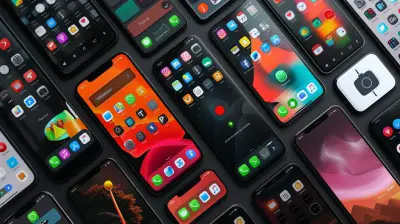How to Use Mobile Apps for Tracking Your Sleep Patterns
28 April 2025
Sleep is one of those things we all know we need, but let’s face it, sometimes we don’t give it the attention it deserves. We live in a fast-paced world filled with endless to-do lists, social media, and late-night Netflix binges. But what if I told you that your smartphone, the same one keeping you up at night, could actually help improve your sleep? Yep, you read that right. Mobile apps can do wonders when it comes to tracking your sleep patterns and helping you get the rest you need.
In this article, we’re going to dive into the world of sleep tracking apps. We'll look at how they work, why they’re useful, and how you can use them to improve the quality of your sleep. So, whether you're an insomniac or someone who just wants to wake up feeling more refreshed, stick around. This could be the game-changer you’ve been looking for.
![]()
Why Sleep Matters More Than You Think
Before we jump into the nitty-gritty of tracking your sleep, let’s take a moment to talk about why sleep is so important. I know, I know. You’ve heard this a million times, but humor me for a second. Sleep isn’t just a way to recharge your batteries. It’s essential for your overall well-being, affecting everything from your mood to your immune system.When you consistently get poor sleep, it can lead to a bunch of problems—think memory issues, weakened immunity, and even an increased risk of chronic diseases like heart disease or diabetes. Not to mention, it makes you feel like a zombie the next day. And nobody likes feeling like a zombie, right?
That's where sleep tracking apps come into play. They can give you a clear picture of your sleep habits and help you identify what’s working and what’s not.
![]()
How Sleep Tracking Apps Work
So, how exactly do these apps know how well (or poorly) you’re sleeping? It’s not magic, I promise. Sleep tracking apps use a combination of sensors in your smartphone or wearable devices (like smartwatches or fitness bands) to monitor your movements and, in some cases, your heart rate.Here’s a simple breakdown of how it works:
1. Motion Detection
Most apps use your phone's accelerometer to detect movement. If you're tossing and turning all night, the app will note that you're having restless sleep. On the flip side, if you're lying still, it assumes you're in a deeper stage of sleep.2. Heart Rate Monitoring
Some apps sync with wearable devices that monitor your heart rate. Your heart rate tends to drop when you’re in deeper stages of sleep, and this data can be used to better understand your sleep cycles.3. Sound Monitoring
Certain sleep tracking apps even use your phone’s microphone to listen for sounds like snoring or sleep talking. Creepy? Maybe a little. But it can provide valuable insights into whether conditions like sleep apnea might be disrupting your rest.4. Sleep Stages
Good sleep consists of several stages, including light sleep, deep sleep, and REM (Rapid Eye Movement) sleep. Sleep tracking apps break down your night into these stages, helping you understand how much time you’re spending in each one.![]()
Benefits of Using Sleep Tracking Apps
Now that you know how these apps work, let’s talk about why you should even bother using one. After all, can’t you just trust how you feel in the morning? Well, yes and no. While you can get a general sense of your sleep quality based on how you feel, sleep tracking apps provide data that’s much more precise. Here are some of the key benefits:1. Better Sleep Awareness
Sometimes we think we’re getting enough sleep, but the data tells a different story. With a sleep tracker, you get a clear picture of how many hours of quality sleep you actually get. Seeing those numbers can be a wake-up call (pun intended) that helps you prioritize your sleep.2. Identifying Sleep Disruptions
Ever wake up in the middle of the night and wonder why? Sleep tracking apps can help you identify patterns, like frequent waking during the night or snoring that might be a sign of sleep apnea. With this knowledge, you can take steps to address the issues.3. Personalized Recommendations
Many sleep tracking apps provide personalized tips based on your sleep data. For example, if the app notices you’re waking up during light sleep, it may suggest adjusting your bedtime or using features like a "smart alarm" to wake you during your lightest sleep phase.4. Tracking Progress
Maybe you’ve decided to make some lifestyle changes, like cutting back on caffeine or sticking to a bedtime routine. Using a sleep tracking app allows you to see if those changes are actually improving your sleep. It’s like having a sleep diary, but way cooler.5. Smart Alarms
Some apps come with a smart alarm feature that wakes you up during your lightest sleep stage. This can help you feel more refreshed compared to waking up during deep sleep. Instead of feeling groggy and disoriented, you’ll be more alert and ready to start your day.![]()
Getting Started: Choosing the Right App
Okay, so now that you’re sold on the idea, how do you pick the right app? While there are tons of options out there, not all sleep tracking apps are created equal. Some are basic, while others offer advanced features like heart rate monitoring and detailed sleep analysis.Here are a few things to consider when choosing a sleep tracking app:
1. Compatibility
First things first—make sure the app is compatible with your device. Some apps are designed specifically for iOS or Android, while others work across platforms. If you plan to use a wearable device, make sure the app syncs with it.2. Features
Think about what you want to get out of the app. Do you just want something that tracks your sleep duration, or are you interested in more detailed insights like sleep stages and heart rate analysis? Some apps also offer features like meditation guides or bedtime stories to help you fall asleep.3. User Interface
You don’t want to spend 10 minutes every morning trying to figure out what your sleep data means. Choose an app that has an intuitive user interface, so you can easily understand your sleep patterns without a PhD in data science.4. Cost
Many sleep tracking apps offer free versions, but they often come with limited features. If you want access to the full suite of tools, you might have to pay for a premium version. Decide how much you're willing to spend and what features are worth the price to you.5. Privacy
Sleep data is personal, so make sure any app you choose has a good privacy policy. You don’t want your sleep habits being sold to advertisers. Check out the app’s data privacy settings before committing.How to Use a Sleep Tracking App Effectively
Once you’ve chosen an app, the next step is using it effectively. Simply downloading the app isn't going to magically improve your sleep. You need to make it a part of your daily routine and pay attention to the data it provides. Here’s how:1. Set Consistent Sleep Goals
Most apps allow you to set sleep goals, like aiming for 7-8 hours of sleep each night. Setting a goal can help you stay accountable and make sleep a priority.2. Use It Every Night
Consistency is key. If you only use the app sporadically, you won’t get accurate data. Try to use it every night, even on weekends, to get a full picture of your sleep patterns.3. Pay Attention to Trends
One night of poor sleep isn’t the end of the world. But if you notice trends—like consistently waking up during the night or not spending enough time in deep sleep—that’s when you should start making adjustments.4. Experiment with Your Routine
Use your sleep data to experiment with your routine. Maybe you’ll find that going to bed 30 minutes earlier makes a big difference, or that avoiding screen time before bed helps you fall asleep faster. The key is to use the data as a tool to improve your sleep habits.5. Don’t Obsess Over the Numbers
While tracking your sleep can provide valuable insights, don’t get too caught up in the numbers. Some nights will be better than others, and that’s perfectly normal. The goal is to improve your overall sleep quality, not to achieve a “perfect” night of sleep every single time.
Common Pitfalls and How to Avoid Them
Even with the best sleep tracking app, there are a few common mistakes people make that can skew their data or make tracking less effective. Here’s what to watch out for:1. Keeping Your Phone Too Close
If your app uses sound monitoring, make sure your phone is placed close enough to pick up sounds but not so close that any noise from notifications wakes you up. Better yet, put your phone on "Do Not Disturb" mode to ensure a peaceful night.2. Ignoring External Factors
Things like caffeine, alcohol, stress, or even the temperature of your room can all affect your sleep. If you notice poor sleep data, consider if any of these factors might be playing a role.3. Not Giving It Time
Don’t expect instant results. It may take a few weeks of consistent tracking before you start noticing trends in your sleep patterns. Be patient!Final Thoughts
Using mobile apps to track your sleep patterns can be an eye-opener (pun intended). With the right app and a little bit of effort, you can gain insights into your sleep habits and take actionable steps to improve your rest. Whether you’re trying to fix a bad sleep schedule or simply want to optimize your sleep quality, these apps can be a fantastic tool in your arsenal. So go ahead, give it a try—you might just wake up feeling like a whole new person.all images in this post were generated using AI tools
Category:
Mobile AppsAuthor:

Kira Sanders
Discussion
rate this article
8 comments
Inez McNeely
Great insights! Tracking sleep with apps can really improve rest quality.
May 17, 2025 at 3:51 AM

Kira Sanders
Thank you! I’m glad you found the insights helpful. Sleep tracking can indeed make a significant difference in rest quality!
Selene Kirkpatrick
Finally mastering my sleep with apps! Who knew tracking dreams could be fun?
May 6, 2025 at 7:53 PM

Kira Sanders
I'm glad to hear that you're finding it enjoyable! Apps can definitely make tracking sleep and dreams both insightful and fun. Happy dreaming!
Eleanor O'Neal
This article provides practical insights on leveraging mobile apps to effectively track sleep patterns. By understanding your sleep habits, you can make informed adjustments for better rest, leading to enhanced overall health and well-being. Great read!
May 4, 2025 at 2:33 AM

Kira Sanders
Thank you for your kind words! I'm glad you found the insights helpful for improving sleep and overall well-being.
Fatima Malone
Mobile apps can revolutionize sleep tracking by providing personalized insights, fostering better habits, and empowering users to enhance their overall well-being through data-driven decisions.
May 2, 2025 at 12:13 PM

Kira Sanders
Thank you for highlighting the potential of mobile apps in sleep tracking! Personalization and data-driven insights are indeed key to improving our sleep habits and overall well-being.
Pia Castillo
Great tips for improving sleep quality!
May 2, 2025 at 4:54 AM

Kira Sanders
Thank you! I'm glad you found the tips helpful for enhancing your sleep quality!
Amos McGowan
Thank you for this insightful article! The rise of mobile apps for sleep tracking is truly fascinating. It’s impressive how technology can help us understand our sleep patterns better. I appreciate the tips you provided, and I look forward to incorporating them into my nightly routine. Great read!
May 1, 2025 at 4:59 AM

Kira Sanders
Thank you for your kind words! I'm glad you found the article helpful and insightful. Sweet dreams!
Maddison Henderson
Who knew my phone could moonlight as a sleep detective? 🕵️♂️💤 Between tracking my Zzz's and plotting my caffeine consumption, I’m convinced my app is one part bedtime buddy, one part snooze saboteur. Can't wait to see if it reveals my secret life as a midnight snack ninja!" 🍕✨
April 29, 2025 at 6:38 PM

Kira Sanders
Glad you’re enjoying your app! It’s amazing how technology can help us understand our sleep habits and lifestyle choices. Keep tracking those Zzz's and midnight snacks! 🍕✨
Icarus Hubbard
Ever thought your app might be a sleep ninja? It tracks your dreams while you snore, turning ZZZs into data! Sweet dreams, techies!
April 28, 2025 at 11:08 AM

Kira Sanders
Thanks for the fun comment! Our app aims to help users understand their sleep patterns, making every ZZZ count! Sweet dreams indeed!
MORE POSTS

Mobile Apps That Will Help You Build Better Habits

Cybersecurity Challenges in the Age of Remote Work

Mobile Connectivity: The Role of Smartphones in the IoT Sphere

How Mobile Apps are Reinventing Traditional Education

How Autonomous Vehicles Are Revolutionizing Emergency Services

Stylus vs. Finger: The Ultimate Guide to Touch Input